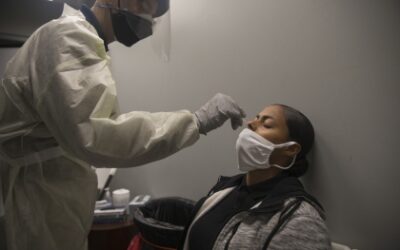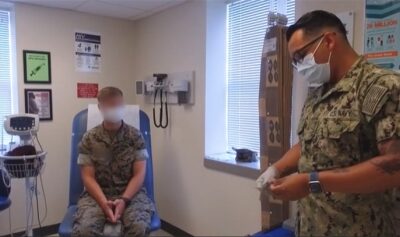Most new diagnoses of oropharyngeal cancer, a type of head and neck cancer, are driven by human papillomavirus (HPV) infections, with distinct genetic and immune differences in HPV-driven and non-HPV-driven head and neck cancer, according to a new study.
Factors Linked to Severe COVID-19 Among Vaccinated, Hospitalized Veterans
Although vaccination and boosting remain the best defense against COVID-19, breakthrough infections among those vaccinated and boosted are exceedingly common.
SCT-Related Deaths Might Be Underestimated in U.S. Military
Sickle cell trait (SCT), a condition in which a person has one abnormal allele of the hemoglobin beta gene, affects an estimated 5.02% of non-Hispanic blacks, 1.08% of Hispanics and 0.1% of whites in the U.S. military.
Veterans With Service-Linked Disabilities Fare Worse After TKA
Service connection (SC) status appears to worsen outcomes for veterans receiving total knee-arthroplasty, according to a new report.
Veterans With RA Face Higher Mortality Risks Than Those Without
Although lessening over time, patients with rheumatoid arthritis (RA) in the VHA have higher risk of all-cause and cause-specific mortality, according to a new study.
VA Study: Paxlovid Can Reduce Risk of ‘Long COVID’ by About 25%
New research from the VA determined that Paxlovid can reduce the risk of symptoms of long COVID by about 25%.
VA Frailty Index Associated With Survival in AML Patients
Acute myeloid leukemia (AML) is a particularly aggressive blood cancer that is most successfully treated with intensive chemotherapy. As the average age at diagnosis is 68, patients diagnosed with the disease are often too frail to withstand potentially curative treatment with induction regimens.
New Models Might Better Predict Bleeding Risks in Cancer Patients With AF
Cancer patients have both an increased risk of developing atrial fibrillation (AF), and those with the condition have a higher risk of cardiovascular-related death at a year.
Survival Outcomes for High Risk Large B-Cell Lymphoma at the VHA
Even with the availability of monoclonal antibody medications, VA patients with primary refractory or relapsed large B-cell lymphoma (LBCL) have poor outcomes.
COVID-19 Minimally Affected Prescriptions, Hospital Admissions for Veterans with MM
As COVID-19 burst upon the world stage, medical care rapidly shifted from in-person visits to telemedicine consultations with varying results among patients with chronic conditions, cancer and other diseases that required regular and ongoing interaction with medical personnel.
Does Metformin Reduce Cancer Risk? The VA Weighs In
Over the last decade, a number of studies have examined a possible association between metformin use and reduction in the risk of cancer, with contradictory results.
VA Research Finds No Link Between First-Line ICIs, Embolism Risk
Retrospective studies suggest that receipt of immune checkpoint inhibitors (ICIs) may increase the risk of venous thromboembolism (VTE) compared to chemotherapy.
Overall Prescriptions Are Low at VHA for CVD, CKD Protective Diabetes Drugs
Even though novel therapies for type 2 diabetes have been proven to reduce the risk of cardiovascular disease and chronic kidney disease progression, VHA prescription rates remain low.
New Tool Estimates Age-Specific Prostate Cancer Risk
A multi-ancestry polygenic risk score (PRS) that stratifies prostate cancer risk across populations has been developed. In a recent study, the developers validated the performance of the PRS in the multi-ancestry Million Veteran Program and additional independent studies.
Survival Rates Better for Prostate Cancer With Radical Prostatectomy
Clinicians haven’t had information on the optimal upfront treatment modality for patients with nonmetastatic Gleason Score 9 and 10 prostate cancer (GS 9-10 PCa).
Second Cancer More Common With Radiotherapy for Prostate Cancer
When men are diagnosed with localized prostate cancer, they are often faced with a difficult decision.
PTSD Appears to Accelerate Multiple Sclerosis Progression for Veterans
An unfortunate confluence of events puts a significant number of veterans at higher risk of both multiple sclerosis and post-traumatic stress disorder (PSTSD). Agent Orange and other exposures make multiple sclerosis (MS) a presumptive condition for those who have served, while combat experience, higher rates of sexual assault and other factors increase the likelihood of PTSD among veterans.
DHA: Chlamydia Is the Most Common Sexually Transmitted Infection Among Active Duty U.S. Military Servicemembers
Chlamydia is the U.S. military’s most common sexually transmitted infection (STI) among active duty servicemembers, according to 2021 and 2022 reports on STIs by the Defense Health Agency’s Armed Forces Health Surveillance Division.
VA Partners With American Kidney Fund, Business to Tackle CKD
Several new partnerships are positioning the VA to offer more extensive services, educational material and testing for the one in six veterans estimated to have chronic kidney disease.
Minimally Invasive Surgery Is Safe, Feasible Option for Diverticulitis
Patients with right colon diverticulitis can consider minimally invasive surgery a safe, feasible treatment option, according to a recent study.
Marijuana Laws Linked to Increasing Cannabis-Use Disorder in Veterans
As laws and attitudes about marijuana use have been relaxed over the past two decades, the substance has become widely regarded by society as innocuous.
Survey: Post-9/11 Veterans More Likely to Exercise, Eat Right Than Civilians
BOSTON — Recent U.S. veterans reported similar or better outcomes than nonveterans when it comes to their health, vocational, financial and social well-being. That is in contrast to some earlier cohorts who had served in the military and lagged behind civilians in some domains.
COVID-19 Could Be Especially Risky for Veterans With Sickle Cell Trait
The presence of sickle cell trait (SCT) should be considered an adverse prognostic factor for COVID-19, according to a new study.
Pharmacogenomic Testing Had Positive Results for Major Depression Patients
Pharmacogenomic testing can help clinicians avoid prescribing antidepressant medications that might have undesirable outcomes.
MHS Researchers Found Current Antibiotic Dosing Guidelines Adequate for Critically Ill Patients With Trauma, Burn
Critical illness caused by burn and sepsis doesn’t alter how the body processes piperacillin and tazobactam (pip-tazo), an antibiotic and beta-lactamase inhibitor drug combination
Chronic Traumatic Encephalopathy Is Uncommon in Brains of Military Personnel
Military personnel exposed to attacks with high explosives frequently experience neuropsychiatric symptoms, including cognitive dysfunction, behavioral changes, mood disturbances and suicidality.
VA Liquid Biopsy Study Aims to Screen 10,000 Veterans for Cancer
Veterans comprise nearly one-third of the participants in a major study evaluating a multi-cancer, early-detection blood test.
Height Might Be a Risk Factor for Several CV Conditions
Height appears to be an unrecognized non-modifiable risk factor for several common conditions in adults, according to a study using data from the VA Million Veteran Program.
Ground-breaking Study in U.S. Military Finds Link Between MS, Epstein-Barr Virus
Researchers with the Uniformed Services University of Health Sciences (USUHS) and the Harvard T.H. Chan School of Public Health appear to have solved one of the most perplexing mysteries in medicine: What causes multiple sclerosis (MS)?
Hormones Affect Sexual Function After AHSCT
How do hormones affect sexual function recovery after autologous hematopoietic stem cell transplantation (AHSCT), which is the standard of care for younger patients with newly diagnosed multiple myeloma.






